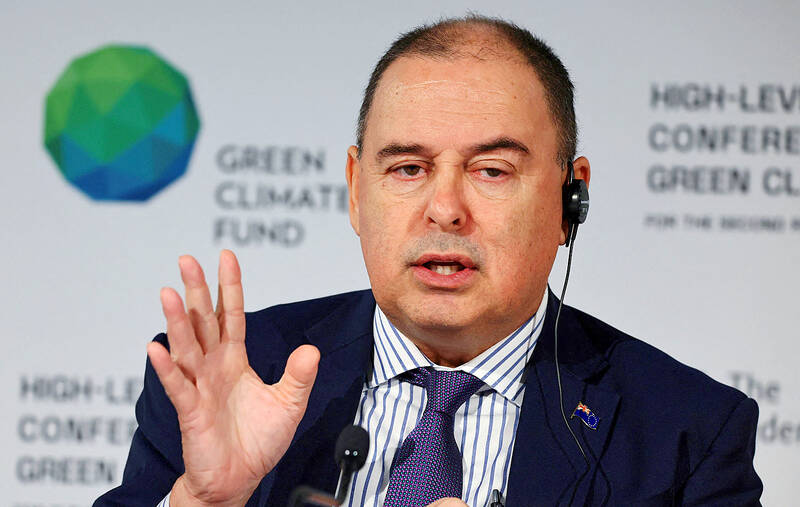A strategic partnership deal between China and the Cook Islands spans areas from deep-sea mining to education scholarships, but excludes security ties, a document released by the Pacific nation’s government showed.
Western nations that traditionally held sway in the region have become increasingly concerned about China’s plans to increase influence after Beijing signed defense, trade and financial deals with Pacific countries in the past three years.
Amid domestic criticism of lack of transparency, the government unveiled the action plan for the deal on Monday in the Cook Islands, in response to calls from New Zealand, which had not been consulted, despite constitutional ties.

Photo: Reuters
“This does not replace our longstanding relationships with New Zealand, Australia and others, but rather complements them, ensuring that we have a diversified portfolio of partnerships,” Cook Islands Prime Minister Mark Brown told parliament.
“We are strengthening economic diplomacy through initiatives like our comprehensive strategic partnership with China,” he added, pointing to opportunities on offer in areas such as trade, infrastructure and ocean resources.
Opposition has grown in the Cook Islands to any threat its pacts with China pose to close ties with New Zealand, and Brown’s government faces a no-confidence vote in parliament after Tuesday next week called by opposition parties.
Brown’s remarks, which also expressed confidence in Cook Islands’ ability to protect its interests, followed a protest march to parliament in the capital of Avarua backing ties with New Zealand.
“Stay connected with New Zealand,” read one placard held by protesters, who also brandished huge replicas of New Zealand passports.
“The first concern is the lack of consultation not only with us Cook Islanders, but also with New Zealand,” said opposition leader Tina Browne, who had pushed for transparency on the deal.
China is to give a one-time grant of about US$4 million to the nation of 15,000, Brown told reporters after his return home from Beijing.
New Zealand raised concerns about his visit to China, as it had not seen in advance the agreements signed, despite having asked to review them.
A spokesman for New Zealand’s deputy prime minister said he looked forward to the release of all the pacts signed on the trip.
The neighboring government would need to analyze the contents of the pact released on Monday and its implications for New Zealand and the people of Cook Islands, whose government it intends to engage with in the coming days, he added.
Situated halfway between Hawaii and New Zealand, the self-governing Cook Islands can interact with the international community as an independent state.
The neighbors have committed to consulting on security, defense and foreign relations. New Zealand also provides some budget support and commits to defend the people, who are its citizens.
Seabed mining, hydrography, disaster relief and cultural ties are areas the pact earmarks for cooperation.It does not explicitly mention security, but the prospect of greater maritime cooperation could fuel concern over potential military use of information and marine infrastructure.
While New Zealand has previously quashed the Cook Islands’ aspirations of joining the UN without becoming independent, Monday’s action plan says China would back its hopes to widen membership of global bodies.

PRECARIOUS RELATIONS: Commentators in Saudi Arabia accuse the UAE of growing too bold, backing forces at odds with Saudi interests in various conflicts A Saudi Arabian media campaign targeting the United Arab Emirates (UAE) has deepened the Gulf’s worst row in years, stoking fears of a damaging fall-out in the financial heart of the Middle East. Fiery accusations of rights abuses and betrayal have circulated for weeks in state-run and social media after a brief conflict in Yemen, where Saudi airstrikes quelled an offensive by UAE-backed separatists. The United Arab Emirates is “investing in chaos and supporting secessionists” from Libya to Yemen and the Horn of Africa, Saudi Arabia’s al-Ekhbariya TV charged in a report this week. Such invective has been unheard of

US President Donald Trump on Saturday warned Canada that if it concludes a trade deal with China, he would impose a 100 percent tariff on all goods coming over the border. Relations between the US and its northern neighbor have been rocky since Trump returned to the White House a year ago, with spats over trade and Canadian Prime Minister Mark Carney decrying a “rupture” in the US-led global order. During a visit to Beijing earlier this month, Carney hailed a “new strategic partnership” with China that resulted in a “preliminary, but landmark trade agreement” to reduce tariffs — but

Chinese President Xi Jinping’s (習近平) purge of his most senior general is driven by his effort to both secure “total control” of his military and root out corruption, US Ambassador to China David Perdue said told Bloomberg Television yesterday. The probe into Zhang Youxia (張又俠), Xi’s second-in-command, announced over the weekend, is a “major development,” Perdue said, citing the family connections the vice chair of China’s apex military commission has with Xi. Chinese authorities said Zhang was being investigated for suspected serious discipline and law violations, without disclosing further details. “I take him at his word that there’s a corruption effort under

China executed 11 people linked to Myanmar criminal gangs, including “key members” of telecom scam operations, state media reported yesterday, as Beijing toughens its response to the sprawling, transnational industry. Fraud compounds where scammers lure Internet users into fake romantic relationships and cryptocurrency investments have flourished across Southeast Asia, including in Myanmar. Initially largely targeting Chinese speakers, the criminal groups behind the compounds have expanded operations into multiple languages to steal from victims around the world. Those conducting the scams are sometimes willing con artists, and other times trafficked foreign nationals forced to work. In the past few years, Beijing has stepped up cooperation